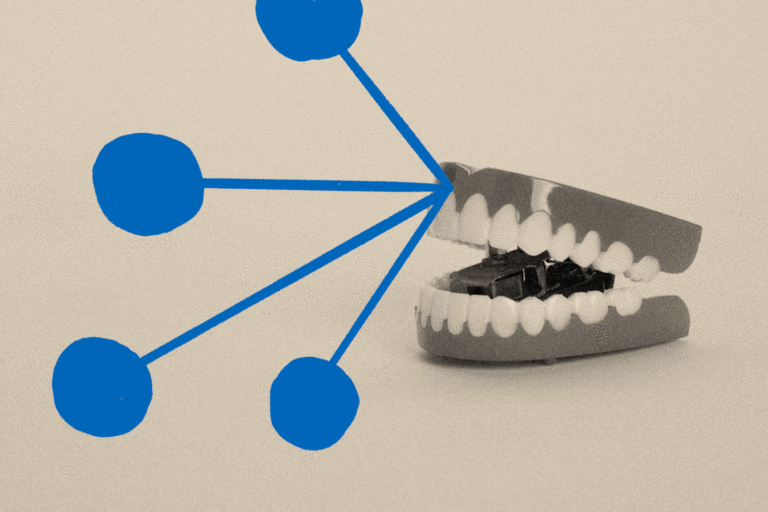Poor oral health has been associated with increased risk of death. ONE recently published analysis in the journal Nature Communications, which collected the results of 294 studies, showed that dental disease is associated with a higher risk of depression, rheumatoid arthritis, inflammatory diseases, obesity, asthma, diabetes, dementia, cancer and chronic diseases of the liver, kidneys and lungs.
The studies were observational, which cannot determine causation, but show that patients with gum disease are at much higher risk for a wide range of serious medical problems.
Different forms of gingivitis
The mouth is covered with a fluid that is a mixture of saliva and bacteria. This fluid coating is referred to as the dental biofilm, and when kept healthy with dental hygiene, the good bacteria prevent the formation of bad bacteria.
But if bad bacteria replace the good bacteria in the biofilm, they can cause gum disease or periodontal disease—a group of conditions that cause chronic inflammation.
The early form of gum disease is called gingivitis. Gingivitis is characterized by red, swollen gums that bleed easily. Bleeding is painless and many people may not seek treatment for it.
Gingivitis, however, can develop into periodontitis, when unhealthy bacteria begin to erode the bone and tissues that hold the teeth in place.
This erosion forms deeper cavities around the teeth, which become the breeding ground for even more growth of pathogenic bacteria as they spread from the roots to the bones that hold the teeth together. If left unchecked, periodontitis can cause tooth loss and is associated with a number of medical conditions.
Gingivitis is linked to heart problems
Poor oral health is most consistently associated with a increased danger of heart disease.
Gum disease is associated with a higher incidence Diabetes and high blood pressure, two of the main risk factors for heart disease. Gingivitis is also associated with other life-threatening conditions such as Strokewhich is mostly driven by the same process that causes the majority of heart attacks: atherosclerosis.
The role of inflammation in heart problems
Atherosclerosis refers to the chronic process that results in the buildup of cholesterol-filled plaques inside the blood vessels.
Progressive atherosclerosis, depending on the blood vessels it affects, can limit the supply of oxygen to any part of the body, including the brain, heart, extremities, and intestine. And if any of these plaques rupture, it can lead to a sudden interruption of blood supply, leading to potentially fatal complications such as heart attacks or strokes.
Both the development of atheromatous plaques and their destructive rupture are caused by inflammationactivated by the body’s immune system.
When someone has gum disease, unhealthy bacteria can be transferred from the mouth to the patient’s body, causing chronic inflammationwhich can then lead to atherosclerosis.
Bacteria found in the mouth have been found in atheromatous plaquesleading to the hypothesis that chronic inflammation caused by gingivitis is associated with heart disease and stroke.
Does treating gingivitis reduce the risk of heart disease?
The correlation between gum disease and general health problems, especially heart disease, is pretty clear.
But it exists few facts This proves conclusively that dental scaling and cleaning procedures can reduce the risk of heart disease. This is mainly due to the lack of rigorous studies evaluating the impact of gingivitis treatment on the incidence of heart disease.
How to prevent gum disease
Regular dental hygiene is key to preventing gingivitis. Given the consistent association between gum disease and heart disease and its risk factors, I recommend that all my patients maintain good dental hygiene and receive regular dental care to prevent and treat gingivitis. I advise them to:
- Brush twice a day for two minutes.
- Replace the toothbrush after its bristles wear out, otherwise the brush itself can become a home for bacteria.
- Floss to remove plaque that builds up between teeth.
- Visit a dentist twice a year for a cleaning, as this can better remove unhealthy bacteria, especially from crevices or indentations.
- If the gums are bleeding, which can be a sign of gingivitis, see a dentist.
A deep cleaning and enhanced hygiene can easily reverse the course of gingivitis before it progresses to periodontitis and can reduce the risk of many health conditions.
Meet the Doctor: Haider Warraich is a cardiologist at the VA Boston Healthcare System and Brigham and Women’s Hospital, an assistant professor at Harvard Medical School, and the author of “Heart Condition: Exploring the History, Science, and Future of Heart Disease.”


